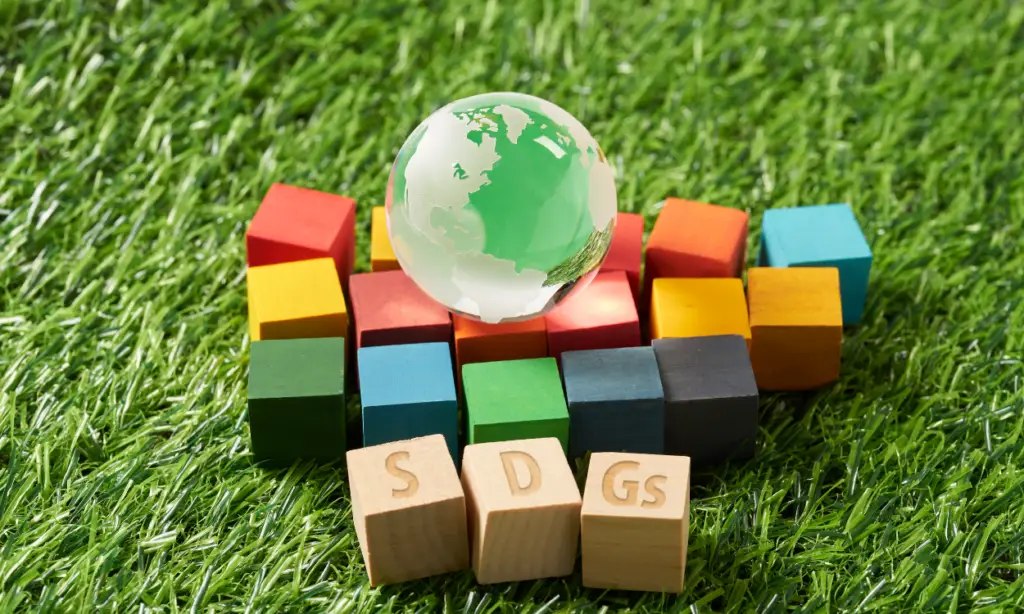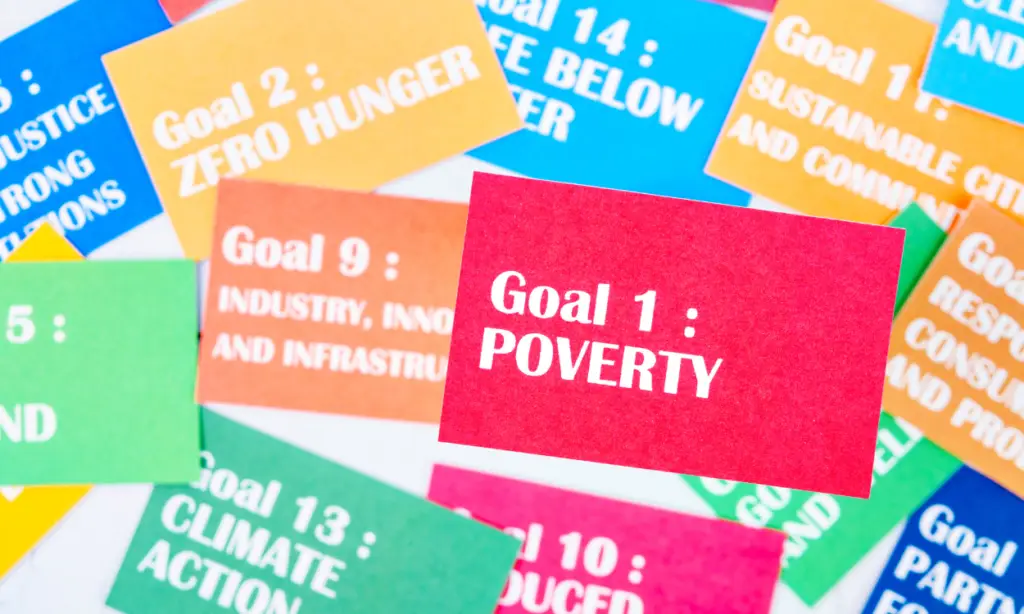
The roots of the 17 SDGs can be traced back to The United Nations Conference on Sustainable Development or Rio+20 Conference, where global leaders recognized the need for an encompassing framework to guide global development. This conference built upon decades of international efforts to address worldwide challenges, echoing commitments made during the Millennium Summit in 2000 and its subsequent Millennium Development Goals (MDGs). However, with the MDGs expiring in 2015 and the world facing increasingly complex issues, there was an urgent need for a more comprehensive approach.
Fast forward to 2015, the year that the 17 SDGs came into existence and were subsequently formally adopted by all United Nations Member States, serving as a universal call to action to end poverty, safeguard the planet, and ensure prosperity for all by 2030. Spanning a diverse range of areas, these goals are designed to be interlinked, recognizing the intricate nature of our global challenges.
1. No Poverty: Businesses can play a transformative role by implementing inclusive economic growth, ensuring fair wages, supporting local communities, and innovating affordable products and services targeting the economically disadvantaged.
2. Zero Hunger: By supporting sustainable agricultural practices, cutting down food waste, enhancing food supply chains, and collaborating with agri-tech innovations, businesses can ensure food security for all.
3. Good Health & Well-being: Beyond offering health insurance and wellness programs, companies can invest in medical research, partner with healthcare providers, and promote products/services that improve public health.
4. Quality Education: From scholarships, internships, and training programs to collaborations with educational institutions and NGOs, businesses can uplift global educational standards.
5. Gender Equality: An inclusive workplace that offers equal opportunities, supports women entrepreneurship, and runs campaigns against gender discrimination highlights how businesses can champion this goal.
6. Clean Water & Sanitation: Investing in clean water projects, minimizing water wastage, and introducing sustainable sanitation solutions in their supply chains can be a starting point for corporations.
7. Affordable & Clean Energy: By transitioning to renewable energy sources, supporting clean energy research, and making energy-efficient products, businesses can make this goal a reality.
8. Decent Work & Economic Growth: Prioritizing employee welfare, promoting a culture of lifelong learning, and supporting small businesses and startups are ways companies can contribute.
9. Industry, Innovation & Infrastructure: Encouraging R&D, fostering innovation hubs, and supporting resilient infrastructure projects, especially in developing regions, is crucial.
10. Reduced Inequalities: By addressing wage disparities, supporting marginalized communities, and championing inclusive products and services, businesses can take steps towards reducing inequalities.
11. Sustainable Cities & Communities: Sustainable real estate practices, urban farming projects, waste management solutions, and supporting green public transport options are some areas of focus.
12. Responsible Consumption & Production: Companies can emphasize circular economy principles, ensuring products are sustainably sourced, manufactured, used, and recycled.
13. Climate Action: Carbon neutrality, sustainable supply chains, investment in eco-friendly technologies, and support for reforestation are a few business action points.
14. Life Below Water: Businesses can advocate for sustainable marine practices, invest in technology that reduces water pollution, and sponsor marine conservation initiatives.
15. Life on Land: Reforestation projects, sustainable land-use policies, combating desertification, and supporting wildlife conservation are paths businesses can tread.
16. Peace, Justice, & Strong Institutions: Upholding ethical business practices, supporting the rule of law, promoting peacekeeping initiatives, and collaborating with just institutions will pave the way.
17. Partnerships for the Goals: Joint initiatives, collaborations, sharing of resources and knowledge among businesses, and partnerships with governments and NGOs can lead to magnified impacts.

The increasing global emphasis on the SDGs has spurred many businesses to align with these goals. However, not all these alignments are genuine. “SDG washing” refers to the superficial and deceptive association of businesses with the Sustainable Development Goals without genuine intent or substantial action. This practice mirrors the concept of ‘greenwashing’, where firms falsely portray their environmental actions.
Authentic alignment with the SDGs demands transparency, commitment, and measurable actions. It is essential for businesses to not only proclaim their support for these goals but also to highlight the concrete steps taken toward their realization. In an era of digital transparency, where consumers and stakeholders have the tools to scrutinize claims, superficial alignment can backfire, damaging brand image and trust. A truly SDG-aligned business will prioritize genuine impact over publicity, integrate the goals into their core strategy, and openly report on progress and challenges.
The path towards achieving the SDGs by 2030 has encountered numerous obstacles. As meticulously detailed by Amanda Williams, Patrick Haack, & Knut Haanaes in their article ‘Putting the SDGs Back on Track’ published in the Stanford Social Innovation Review (SSIR):
Pandemic Setbacks: The unforeseen ramifications of the COVID-19 pandemic have led to economic downturns and strained health systems worldwide. This has directly affected the progress of several SDGs, especially those related to health, economy, and education. The article highlights the increasing gap in digital access, with many in developing nations being left behind in the rapid switch to online learning and work.
Geopolitical Strains: The geopolitical tensions, such as the Ukraine war, have diverted attention and resources from sustainable development. These conflicts often result in the displacement of populations, further exacerbating issues like poverty and health.
Environmental Crises: The global energy shortage and the escalating frequency of climate disasters, such as hurricanes, wildfires, and droughts, pose significant challenges. The authors emphasize that these events are not only direct threats to our environment but also disrupt global supply chains, which in turn affects economies and the well-being of societies.
Economic Disparities: While the world has witnessed an unprecedented era of wealth creation, economic disparities continue to widen. This growing chasm threatens the goals related to reducing inequality.
The article underscores the urgent need for global cooperation and strategic, adaptive measures to overcome these challenges. The authors argue for holistic strategies that don’t merely address the symptoms but delve into root causes, promoting sustainable and resilient solutions.
For the global community to overcome these SDG hindrances, there is a pressing need for unified action, resource allocation, and a renewed focus on shared sustainability objectives.
EcoSkills Academy stands at the forefront of promoting genuine SDG alignment, offering a robust platform tailored for today’s challenges:
Holistic Curriculum: Beyond basic courses, EcoSkills intertwines real-world scenarios with theoretical knowledge, empowering learners to implement sustainable strategies effectively.
Personalized Learning Paths: EcoSkills recognizes that each business’s sustainability journey is unique. Hence, it offers tailored courses, allowing progressive organizations to address their specific challenges and opportunities.
Expert-led Sessions: EcoSkills Academy boasts a great deal of industry insights (across multiple industries), ensuring that learners benefit from both theoretical knowledge and practical insights created by those who have been at the forefront of sustainable initiatives.
Continuous Learning: EcoSkills’ commitment to being updated reflects the dynamic nature of sustainability challenges. Regular course updates ensure learners always have access to the latest information.
Interactive Platforms: EcoSkills Academy places a strong emphasis on interactive learning. Through its material and course structure, it fosters problem-solving and idea generation.
In a world where sustainable practices are increasingly becoming the norm, EcoSkills Academy ensures that businesses and individuals are not just well-informed but are also equipped with the tools and knowledge to make a genuine impact.
In an age defined by rapid technological advances contrasted with unprecedented global challenges, the SDGs serve as both an anchor and a compass. These goals remind us of our collective aspiration for a better world and provide a structured pathway to achieve it.
However, the journey to 2030 is not a straightforward one. As clearly observed, numerous external events can deter progress in the implementation of the SDGS. But it is essential to interpret these not just as roadblocks but as markers, reminding us of the urgency and the need to adapt. In this constantly shifting landscape, institutions like EcoSkills Academy play a pivotal role. By offering up-to-date knowledge, fostering a sustainable spirit, and emphasizing genuine alignment, they ensure that forward-thinking individuals and organizations alike are not just passengers but active drivers on the road to a sustainable future.
It is not just about reaching the destination but about the journey and the impact that humanity (as a whole) makes along the way. With informed guidance, commitment, and collective action, the vision of the SDGs can indeed become a shared reality spanning the entire planet.
